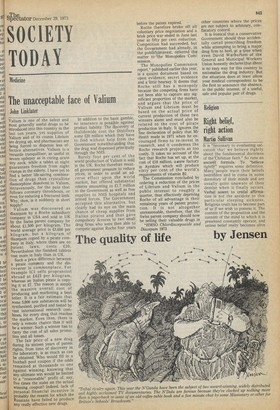The unacceptable face of Valium
John Linklater
Valium is one of the safest and most generally useful drugs to be introduced into this Country in the last ten years, yet supplies of Valium and of its cousin Librium are drying up, and pharmacists are being forced to dispense less effective alternatives. Valium is•a versatile tranquilliser, as useful in severe epilepsy as in curing acute Wry neck, while a tablet at night guarantees freedom from night cramps in the elderly. I have yet ti find a better life-saving combination of drugs than crystalline diamorphine dissolved in Valium, intravenously, for the pain that follows coronary thrombosis, or even for reducing a fractured limb. Why, then, is it suddenly in short supply?
Valium was discovered as diazepam by a Roche subsidiary company in USA and sold in UK by the Swiss parent company for about £1,500 per kilogram. The World average price is £3,600 per kilogram, but a kilogram of diazepam copied by a pirate company in Italy, where there are no Patent laws, costs £20. Nevertheless the finished tablets cost more in Italy than in UK.
Such a price difference between a pirate company and the discoverer is commonplace. For example ICI sells propranolol abroad at £425 per kilogram, Whereas an Italian pirate is copying it at £7. The reason is simply the massive overall cost of producing and marketing a best seller. It is a fair estimate that some 5,000 new substances will be synthesised, purified and tested by vast international research combines, for every drug that reaches the market. Even then, there is only 'a remote chance that it will be a winner. Such a winner has to carry the cost of all sales promotion and all losses.
The fair price of a new drug during its sixteen years of patent rights, from time of discovery in the laboratory, is as much as can be obtained. Who would fill in a football pool coupon if the odds remained at thousands to one against winning, knowing that any ultimate win would be limited to a "reasonable" profit of, say, five times the stake on the actual winning coupon? Indeed, lack of personal financial incentive is Probably the reason for which the Russians have failed to produce any really effective new drugs. In addition to the basic gamble, no insurance is possible against product liability. The discovery of thalidomide cost the Distillers some £20 million which they have to find without help from the Government notwithstanding that the drug wag dispensed principally through the NHS. Barely four per cent of the world production of Valium is sold in the UK. Roche therefore resisted government pressure to reduce prices, in order to avoid an adverse effect upon the world market, but offered substantial rebates amounting to £1.7 million to the Government as well as free supplies to NHS hospitals and armed forces. The Government accepted this alternative, but clearly had its eye on the main chance of cheap supplies from Italian pirates and thus gave compulsory licences to two small, drug firms who were then able to' compete against Roche four years before the patent expired.
Roche therefore broke off all voluntary price negotiation and a brisk price war ended in June last year at fifty per cent reduction. Competition had succeeded, but the Government had already, in the publiainterest, referred the matter to 'the Monopolies Commission.
The Monopolies Commission report,'" published earlier this year, is a quaint document based on open evidence, secret evidence and a little•hearsay. It deems that Roche still has a monopoly because the competing firms have not been able to capture any significant proportion of the market, and argues that the price of Valium and Librium must be based on the actual price of current production of these two winners alone and must also be related to the cost of pirate production in Italy. It ignores the fine declaration of policy that Mr Heath made in 1971 when he encouraged firms to re-invest in research, and it condemns the Roche research projects as too costly. It takes no account of the fact that Roche has set up, at the cost of £10 million, anew factory in Ayrshire which will produce sixty per cent of the world's requirements of vitamin Bl.
The Commission concluded by ordering a reduction of the prices of Librium and Valium in the public interest to roughly a quarter, thus effectively depriving Roche of all advantage in their remaining years of patent protection. It is not altogether unreasonable, therefore, that the Swiss parent company should now be selling their valuable drugs in
"HMSO Chlordiazepoxide and Diazepam 1973
other countries where the prices are not subject to arbitrary, confiscatory control.
It is ironical that a conservative Government should thus accidentally curtail prescribing freedom while attempting to bring a major drug Tirm to heel, at a time when even David Warburton of.the General and Municipal Workers Union honestly declares that there is no easy way for this country to nationalise the drug industry. But the situation does at least allow your medical correspondent to be the first to announce the absence, in the public interest, of a useful, safe and popular pair of drugs.


























 Previous page
Previous page